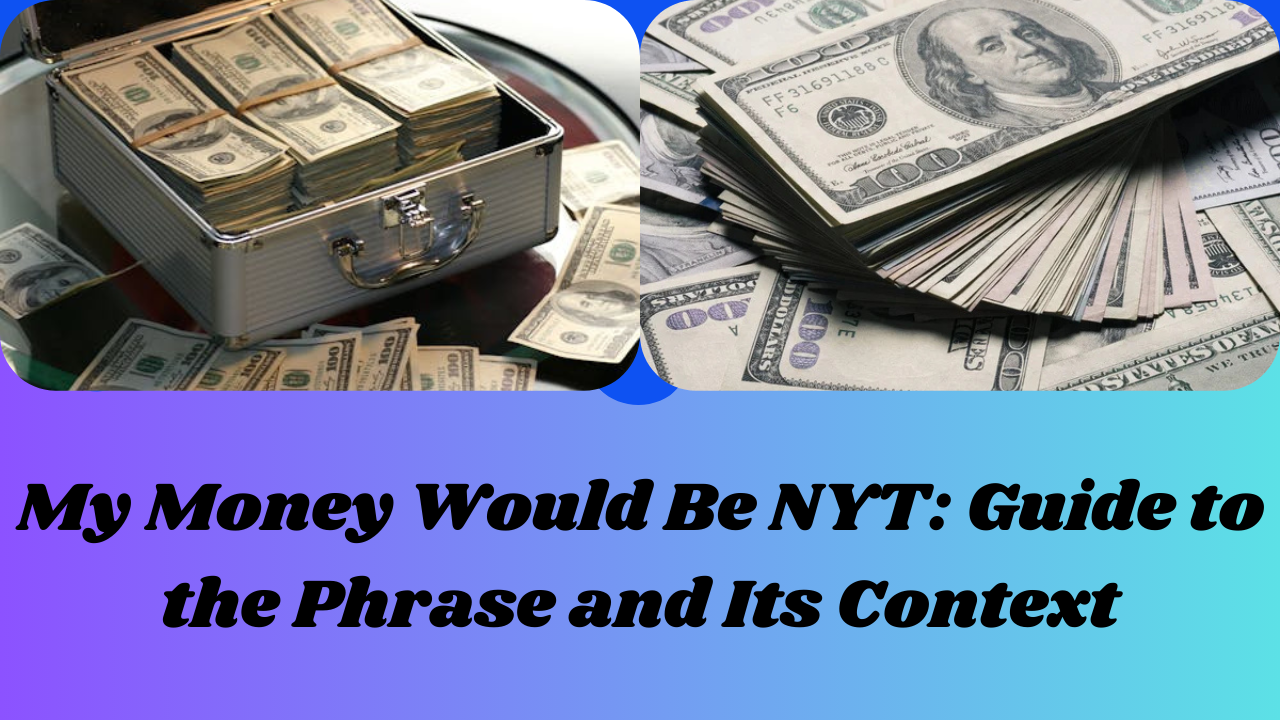If you’ve stumbled upon the phrase “My Money Would Be” in connection with The New York Times (NYT), you’re not alone. This seemingly casual expression has piqued the curiosity of many readers and crossword enthusiasts. Whether it’s a witty clue, a financial reference, or part of cultural commentary, understanding its relevance can give you clarity and context.
But what exactly does it mean? Where does it come from? Let’s break it all down.
Understanding the Phrase: “My Money Would Be”
The phrase “My Money Would Be” is often used conversationally to express confidence in a particular outcome or choice. For example:
- “If I had to bet, my money would be on the Yankees winning tonight.”
- “My money would be on her getting the promotion.”
Essentially, it reflects personal judgment, assurance, or speculation.
In the context of The New York Times (NYT), this phrase frequently appears in:
- Crossword puzzles
- Opinion pieces
- Financial or cultural articles
It’s a versatile expression, which adds flair to language while conveying strong but informal predictions.
“My Money Would Be” in NYT Crosswords
The New York Times Crossword is one of the most popular and widely recognized puzzles in the world. Enthusiasts know that language in NYT crosswords is both clever and challenging. Phrases like “My Money Would Be” often appear as:
- Clues: The phrase can be part of wordplay, asking solvers to think of confident bets, predictions, or synonyms for phrases like “I’d bet on…”.
- Answers: It could directly or indirectly lead to terms such as wager, bet, odds, or other gambling-related words.
Example: A clue might read: “Where confidence lies for gamblers (4 letters).”
Answer: BETS.
The beauty of NYT crosswords is their ability to take everyday phrases and make solvers think deeply about their meaning.
Financial Relevance in NYT Articles
The New York Times is renowned for its finance and economics coverage. “My Money Would Be” naturally aligns with discussions of:
- Investments
- Stock market trends
- Financial predictions
- Economic outcomes
For instance, a financial columnist might write:
“Given the current state of inflation and consumer behavior, my money would be on a steady rise in interest rates.”
This phrasing adds a personal tone while maintaining authority.
Cultural References in NYT Opinion Pieces
NYT opinion articles often explore social, political, and cultural topics. Writers frequently use colloquial expressions like “my money would be” to share their viewpoints in a relatable way.
Example:
- “If there’s one person who can redefine modern cinema, my money would be on Greta Gerwig.”
- “My money would be on remote work becoming a permanent fixture in corporate America.”
Such language bridges the gap between formal journalism and conversational relatability.
Why the Phrase Resonates
The charm of “My Money Would Be” lies in its universal applicability. It’s confident without being overbearing. Whether used in a playful crossword clue, a serious financial prediction, or an opinion column, the phrase resonates because:
- It’s easy to understand.
- It conveys certainty while inviting debate.
- It adds a personal touch to otherwise formal discussions.
The New York Times often employs language like this to keep readers engaged while maintaining its professional tone.
Examples of How the NYT Uses “My Money Would Be”
To solidify the concept, here are a few hypothetical examples where the phrase might appear in NYT articles:
- Sports Section: “With their star player back from injury, my money would be on the Lakers clinching the playoffs.”
- Finance: “Given the current market volatility, my money would be on safer investments like bonds.”
- Culture: “My money would be on Taylor Swift winning Album of the Year once again.”
- Politics: “Looking at polling data, my money would be on voter turnout setting new records this election cycle.”
How NYT Crossword Lovers Encounter the Phrase
ALSO READ: Salma Hayek Films: Best Roles and Iconic Performances
Crossword enthusiasts who frequent the New York Times puzzles know how satisfying it is to solve clues based on common sayings. A phrase like “my money would be” often serves as a springboard for answers related to:
- Gambling (BET, WAGER, ODDS)
- Confidence (SURE, CERTAIN)
- Predictions (FUTURE, CHOICE)
This adds an element of fun and challenge to the solving process.
Final Thoughts
The phrase “My Money Would Be” carries a sense of prediction, confidence, and relatability. Whether you encounter it in a crossword puzzle, a financial column, or a cultural opinion piece in The New York Times, it always feels natural and relevant.
Its versatility makes it a favorite among writers and editors at the NYT, and it continues to engage readers across the world.
So, the next time you see “My Money Would Be” in the New York Times, you’ll know exactly why it’s there—to inspire confidence, provoke thought, and connect with readers like you.

